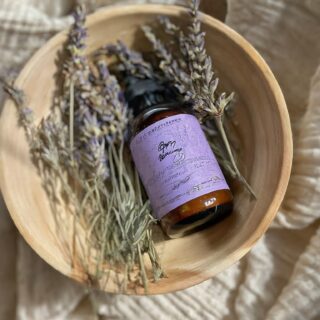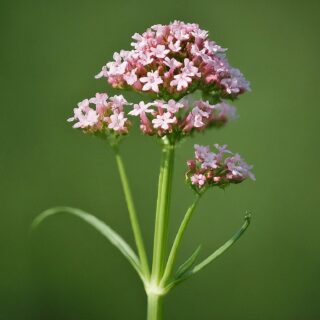Sleep is as vital to our health as water and breathing. Insufficient sleep not only makes us cranky, unfocused, and anxious, but it also poses serious risks to our health. Sleep deprivation has been shown to increase one’s risk of cardiovascular disease, obesity, diabetes, and in some cases, death [1]. Let’s explore some of the best natural sleep aids to help support your journey to natural, refreshing sleep.
Still, one in three American adults admit to not getting enough sleep. Other statistics estimate that 50 to 70 million Americans suffer from sleep disorders like insomnia [2].
With so many Americans tossing and turning at night, it’s no wonder that over-the-counter and prescription sleep aids are popular for helping people fall and stay asleep. But while these medications may successfully knock you out, they often come with unwanted side effects such as next-day grogginess, headaches, and nausea.
This is where natural sleep aids come in handy. Made from plants, vitamins and minerals, or compounds naturally present in the body, natural sleep aids offer a safer and more natural alternative to OTC or prescription medications. They are often associated with less side effects and can complement a holistic lifestyle.
That being said, not every natural sleep aid will work for everyone. This article covers the best natural sleep aids to help you find the best ones for you.
What Are the Best Natural Sleep Aids?
Jujube
Jujube is a plant native to Asia and Australia. Both its fruit and seeds provide health benefits, and it has long been used in Traditional Chinese Medicine for its sedative and anti-anxiety properties.
What makes jujube so effective as a sleep aid is the fact that it contains saponins, which are compounds commonly found in legume plants.
Research shows that the saponins in jujube can increase GABA production, a neurotransmitter that relaxes and sedates the body [3], and reduce hippocampus activity, a region of the brain involved in memory and learning [4]. Both of these processes can help calm the mind and allow you to enter a restful state.
One study found, for example, that postmenopausal women who took 500 mg of jujube per day for 21 days experienced improvements in their sleep [5].
So if a racing mind is keeping you up at night, a jujube supplement might be the perfect natural sleep aid for you.
Key Benefits of Jujube Supplements:
- Natural Sedative Properties: Jujube contains saponins that can help increase GABA production, promoting relaxation and sedation.
- Anti-Anxiety Effects: By reducing hippocampus activity, jujube can help calm your mind, making it easier to fall asleep.
- Scientific Backing: Studies have demonstrated that jujube supplements can improve sleep quality, especially in individuals experiencing postmenopausal symptoms.
How to Use Jujube Supplements:
- Dosage: Typically, 500 mg per day is recommended, but always consult with a healthcare provider for personalized advice.
- Timing: Take the supplement about 30 minutes to an hour before bedtime to allow it to take effect.
- Consistency: For best results, use the supplement consistently for at least three weeks.
Interesting Fact: The jujube plant has been used in Traditional Chinese Medicine for thousands of years not only for its sedative properties but also for its ability to boost overall health.
Remember, while jujube supplements are generally safe, it’s essential to consult with a healthcare professional before starting any new supplement regimen.
Chamomile
For many, drinking tea before bed is a nightly ritual that helps them relax and fall asleep.
However, chamomile tea can be particularly effective at setting you up for a restful night. This is thanks to its apigenin content, a bioflavonoid with sedative effects.
Similar to jujube, research suggests that apigenin promotes sleepiness by binding to GABA receptors in the brain [6].
Other experts, like neuroscientist Dr. Andrew Huberman, suggest that apigenin acts as a chloride channel agonist and helps shut the forebrain down in preparation for sleep. He also suggests that apigenin contains anti-anxiety components that can prevent sleeplessness caused by an overactive and ruminating mind.
Dr. Huberman’s insights are particularly valuable for understanding the dual role of apigenin:
- Chloride Channel Agonist: By acting as a chloride channel agonist, apigenin facilitates the flow of chloride ions into neurons. This action hyperpolarizes the neuronal membrane, making neurons less likely to fire and thereby helping to calm the brain.
- Anti-Anxiety Properties: Apigenin’s ability to bind to GABA receptors also provides anti-anxiety effects. This reduces mental agitation and racing thoughts, which are common culprits for insomnia.
“By calming both the body and mind, apigenin offers a comprehensive approach to improving sleep quality,” explains Dr. Huberman.
Clinical trials support these theories:
- Study on Chamomile Extract:
- Objective: To evaluate the impact of chamomile extract on sleep quality.
- Findings: Consuming chamomile extract daily shortened the time it took for participants to fall asleep and increased their overall sleep duration [7].
- 2016 Study on Chamomile Tea:
- Participants: Postpartum women.
- Duration: Two weeks.
- Observations: Drinking chamomile tea significantly improved sleep quality in postpartum women, helping them achieve more restful nights [8].
These studies underscore the potential of chamomile, particularly its apigenin content, as a natural aid for better sleep.
Lavender
Have you ever noticed how many beauty products marketed as “relaxing” or “calming” feature lavender as their main ingredient?
This is because lavender, a plant used for fragrances and medicine, contains calming properties that help soothe the body and promote restfulness. It works well as a natural sleep aid and can be used in various ways.
One study showed, for example, that smelling lavender before bed improved sleep quality in postpartum women after 8 weeks [9].
Lavender is a great natural sleep aid for people who don’t want to take a capsule or tablet. Like the study, you can use lavender essential oil in various ways to create a relaxing environment conducive to sleep:
- Diffuser: Add a few drops of lavender essential oil to a diffuser. This will disperse the calming aroma throughout your room, helping to ease anxiety and promote restful sleep.
- Pillow and Sheets: Place a couple of drops on your pillow or bed linens. The scent will linger, creating a soothing atmosphere as you drift off.
- Topical Application: Apply essential oil topically onto your temples or under your nose. Make sure to dilute it with a carrier oil, like coconut or jojoba oil, to avoid skin irritation.
You can also enjoy drinking lavender tea before bed to help calm the body. Simply steep dried lavender flowers in hot water for several minutes. The warm beverage not only aids relaxation but also offers a pleasant pre-sleep ritual.
Note: While lavender essential oils are beneficial for aromatherapy and topical use, they should not be ingested.
Valerian
Valerian is an herb with sedative properties, making it a useful natural sleep aid. Studies suggest that valerian can improve symptoms of insomnia and other sleep disorders.
For example, a 2011 study showed that participants who took 530 milligrams of valerian for a month experienced improvements in their sleep and a reduction of insomnia symptoms [10].
Like many plant-based sleep aids, valerian is also versatile: you can drink it as a tea, combine it with other herbs, or take it in capsule form.
- Tea: Valerian root tea is a popular choice for those looking to relax before bed. Simply steep the dried root in hot water for about 10-15 minutes. You can add honey or lemon to improve its taste.
- Herbal Blends: Valerian can be combined with other calming herbs like chamomile, passionflower, or lemon balm to enhance its sleep-inducing effects.
- Capsules: For those who prefer a more convenient option, valerian supplements are available in capsule form. These capsules usually contain a standardized extract of the herb, ensuring consistent dosage.
That being said, valerian is associated with more side effects and interactions than other natural sleep aids. It’s best to consult a health professional before trying valerian.
- Side Effects: Common side effects may include headaches, dizziness, and gastrointestinal issues such as nausea or stomach cramps.
- Interactions: Valerian can interact with various medications, including sedatives, antidepressants, and anti-anxiety drugs. It’s crucial to discuss these potential interactions with your healthcare provider.
Note: Due to its sedative properties, avoid combining valerian with alcohol or other central nervous system depressants.
By understanding the versatility and precautions associated with valerian, you can make an informed decision on whether this natural remedy is right for you.
Magnesium
Magnesium is an essential mineral. It plays a critical role in bone health, brain function, and heart function. It also has calming effects that can help facilitate sleep [11].
Studies suggest that magnesium improves sleep by regulating melatonin production and relaxing the muscles, which can aid sleep [12]. Similar to apigenin, magnesium is also speculated to interact with GABA, increasing its levels to promote relaxation [13].
Magnesium is widely available in supplement form and is sometimes combined with melatonin to increase its effects. For example, one study showed that participants who took 250 mg of magnesium combined with melatonin reported improved sleep quality and duration [14].
Benefits of Magnesium Supplements
- Improved Sleep Quality: Magnesium supplements have been shown to enhance sleep quality. This mineral helps regulate neurotransmitters and melatonin, the hormone responsible for sleep-wake cycles.
- Muscle Relaxation: Magnesium aids in muscle relaxation, reducing nighttime cramps and discomfort that might disrupt sleep.
- Stress Reduction: By regulating the nervous system, magnesium can help reduce stress and anxiety levels, making it easier to fall asleep.
Combination with Melatonin
Combining magnesium with melatonin can further enhance sleep benefits. Melatonin is a hormone naturally produced by the pineal gland in response to darkness, signaling your body that it’s time to sleep. When taken together, these supplements can provide a more comprehensive approach to tackling sleep issues.
For example, one study showed that participants who took 250 mg of magnesium combined with melatonin reported improved sleep quality and duration [14].
Dosage and Recommendations
- Standard Dosage: The typical dosage ranges from 200 to 400 mg per day for adults.
- Timing: It’s often recommended to take magnesium supplements about 1 hour before bedtime.
- Consultation: Always consult your healthcare provider before starting any new supplement regimen, especially if you have underlying health conditions or are taking other medications.
By understanding how magnesium supplements work and their potential benefits, you can make informed decisions about incorporating them into your nightly routine for better sleep.
Passionflower
Passionflower is a plant that doubles as a natural sleep aid due to its calming properties.
Passionflower works by relaxing the body, which can promote feelings of sleepiness. It has also been shown to reduce anxiety, which can make it easier to fall asleep.
For example, one study showed that participants who took passionflower for one month experienced improved sleep and reduced anxiety levels [15].
Passionflower is also versatile: you can boil dried passion flowers to make tea, buy prepackaged tea bags, or take the herb in capsule, extract, or tablet form. You can also combine passionflower with other natural sleep aids to enhance its effects.
Here are some common methods of consuming passionflower:
- Tea: Boil dried passion flowers to make a soothing tea. This traditional method allows you to control the strength and flavor of the brew.
- Preparation Tip: Use 1-2 grams of dried passionflower per cup of boiling water and steep for about 10 minutes.
- Prepackaged Tea Bags: Convenient and easy to use, these are widely available in health stores and online. Simply steep the tea bag in hot water for a few minutes.
- Product Tip: Look for organic options to avoid pesticides and ensure a purer product.
- Capsules: Available in various dosages, capsules offer a straightforward way to incorporate passionflower into your routine without any preparation.
- Dosage Tip: Follow the manufacturer’s instructions or consult with a healthcare provider for personalized advice.
- Extracts: Liquid extracts provide a concentrated dose of passionflower and can be added to water or juice.
- Usage Tip: Typically, a few drops are sufficient; check the label for specific guidance.
- Tablets: Similar to capsules but often combined with other herbs or vitamins to enhance sleep-promoting effects.
- Combination Tip: Tablets may include ingredients like valerian root or melatonin for added benefits.
Combining Passionflower with Other Natural Sleep Aids
Combining passionflower with other natural sleep aids can enhance its effectiveness:
- Valerian Root: Known for its sedative properties, valerian root works well with passionflower to promote deeper sleep.
- Chamomile: Often consumed as tea, chamomile has mild tranquilizing effects that complement the calming properties of passionflower.
- Melatonin: A hormone that regulates sleep-wake cycles, melatonin can be taken alongside passionflower for improved sleep quality.
By exploring these varied forms and combinations, you can find the most effective way to integrate Passionflower into your nightly routine for better sleep.
Risks and Precautions: Are Natural Sleep Aids Safe?
Many consider natural sleep aids safer than OTC or prescription medications because they often cause fewer side effects and interactions. They are an excellent alternative for people who don’t want to rely on over-the-counter or prescription medication or are looking for a more natural solution.
Potential Risks of Natural Sleep Aids
However, natural sleep aids are not entirely without risk. It’s crucial to be aware of the following considerations:
Consult a Healthcare Professional: Always consult with a health professional before trying a new supplement or natural sleep aid. This is particularly important if you:
- Are pregnant or breastfeeding
- Have allergies
- Take certain medications (e.g., blood thinners, antidepressants)
Possible Side Effects: While generally considered safe, some natural sleep aids can cause side effects such as:
- Dizziness
- Nausea
- Digestive issues
Chronic Sleeplessness vs. Occasional Insomnia
While natural sleep aids are great for alleviating occasional insomnia, chronic sleeplessness could indicate an underlying condition. If you experience insomnia that:
- Lasts Longer Than a Month: Persistent sleeplessness might be a symptom of more serious health issues, such as anxiety, depression, or sleep disorders.
- Interferes with Daily Living: Difficulty concentrating, mood swings, and decreased productivity are signs that your sleeplessness is impacting your daily life.
It is best to speak to a health professional if you are suffering from these symptoms to identify and treat any underlying conditions effectively.
FAQs (Frequently Asked Questions)
What are the potential side effects of using jujube as a natural sleep aid?
Some potential side effects of using jujube as a natural sleep aid may include dizziness, nausea, and digestive issues. It’s important to consult with a healthcare professional before using jujube, especially if you have any existing medical conditions or are taking other medications.
How does chamomile help with improving sleep quality?
Chamomile contains apigenin, an antioxidant that binds to certain receptors in the brain that may promote sleepiness and reduce insomnia. It also has relaxing properties that can help reduce stress and anxiety, making it easier to fall asleep.
Can lavender be used in ways other than aromatherapy to aid in better sleep?
Yes, lavender can be used in various forms such as herbal teas, essential oils for massage, or added to a warm bath. Some people also use lavender sachets under their pillows or invest in lavender-infused bedding for its calming effects.
What is the recommended dosage of valerian as a natural sleep aid?
The recommended dosage of valerian as a natural sleep aid can vary depending on the specific product and individual needs. It’s best to follow the instructions on the product label or consult with a healthcare professional for personalized guidance.






